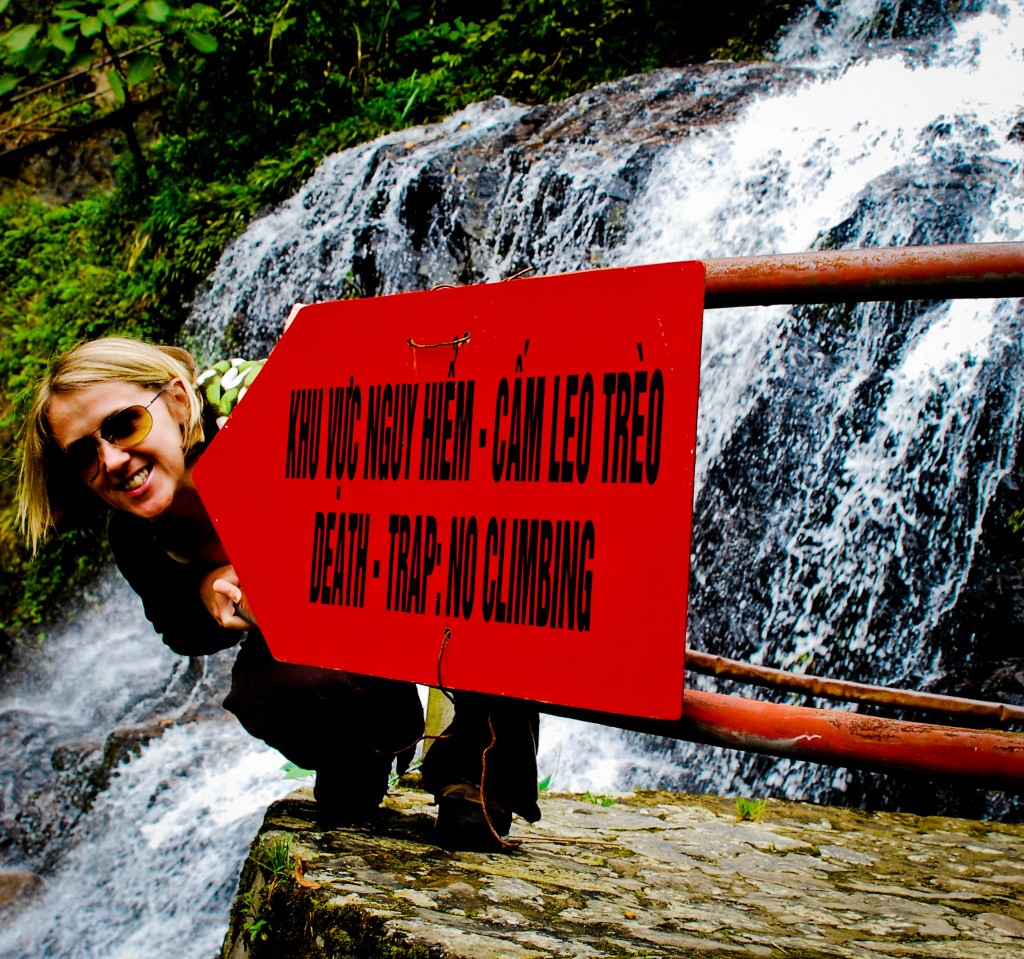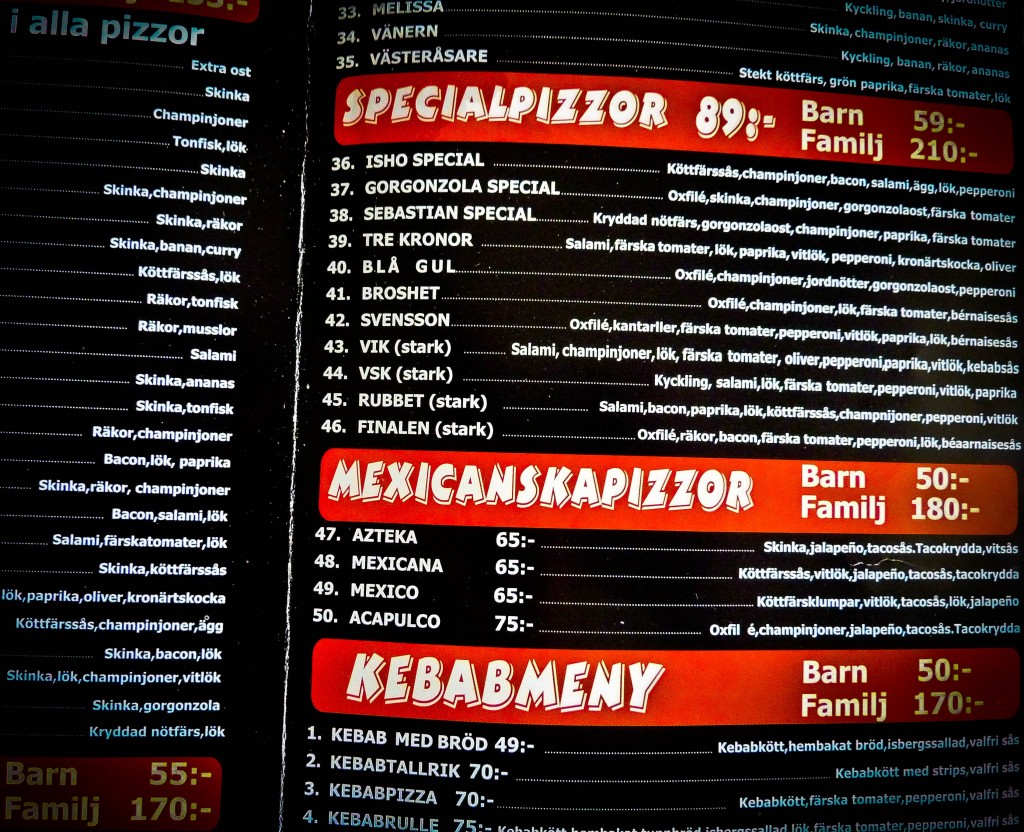Whether or not you should try to learn a few phrases of the local language is a question often discussed among travellers. Some take phrasebooks with them and steadfastly learn a new phrase every day, while others lazily believe that as “everybody speaks English anyway” they don’t need to bother.
Why should we try to learn a few phrases of the local lingo?
At the very least, it is polite to be able to say ‘hello’, ‘goodbye’, ‘thank you’, ‘how much is it’ and ‘where is the…’, as well as days of the week and numbers in the local language. Knowing a few food names wouldn’t hurt either, people will warm to a traveller who makes an effort.
With even the most basic knowledge of the language you will be able to order in a restaurant, haggle more effectively in markets, book buses for the right days, and ask for a toilet when the need desperately arises!

Of course if you are travelling on a RTW trip where you will visit a number of countries it gets harder to learn so many languages, especially for the countries that you might not be spending so much time in. And then there are countries where they speak many different languages—India for example.
Is it acceptable to just assume that everybody can, and will, speak English?
It depends largely on where you go, and to some extent how long you will be there for.
In most of South East Asia you can normally find people who will speak English with you, especially if they are working in the tourist sector—travel agents, guest house owners, and the like. It may not always be perfect English but it is usually good enough. In more remote areas however, you will struggle.

Naively I expected that South America would be the same. It did not take me long to realise that the Spanish either couldn’t, or wouldn’t, speak English. It was time for me to make an effort, and I relished the challenge.
Although I wasn’t good at it I liked the feeling of accomplishment when I had ordered a meal in Spanish and got exactly what I wanted when it arrived. It made me angry when I heard a guy in a restaurant order two hamburgers (speaking loudly and slowly, of course) in English; I wanted to scream at him “Dude! Is it so hard to say ‘dos hamburguesas?!”

In South America I envied the travellers that could speak Spanish. They possessed a key that unlocked the culture and the people. I felt that my experience of the continent was superficial, I could not befriend local people, struggled to understand even simple instructions, or even to communicate with workers at hostel receptions.
As a native English speaker it is very easy for me to travel and I often feel guilty that this has made me lazy. But my boyfriend thinks differently. He is from Sweden and has had to learn English as a second language. When confronted with travellers who do not speak English his attitude is ‘I learned English so that I can communicate with people from other countries, why haven’t you?’ It’s strange for me to think of it like that because I was born in an English-speaking country and haven’t had to learn, most people can speak a little in my language.
My South America trip taught me that I should put more effort into learning at least basic phrases of a local language; I hope to be able to do this on future trips.
How do you get by when you travel? Do you learn a few basic phrases before you go? Are you a non-native English speaker? How do you find travelling, which language do you speak when you are away? Any tips on how to learn a new language? I’d love to hear from you in the comments!





I think we have talked about this before, but I am all for learning the local language. I think it is plain ignorance to go to someone else’s homeland and expect them to be able to speak English with you. You (the general ‘you’) are the one that has chosen to travel to that destination in the first place and therefore attempting to say a few words should be the minimum.
As much as I understand your boyfriend, not all countries are as dedicated (nor might they have the resources) to teach their populations a foreign language like Sweden. Of course being able to speak a few different languages is always going to help you communicate as a whole, it might not in specific places. I think that if anyone is afraid of having to make hand gestures and attempting to communicate in the local language instead of speaking English (or any other language) that they are not cut out for travelling.
End of essay 😀
I agree that if we have chosen to travel then we should make some effort in the language. Non English speakers will do this naturally as they will not be able to use English as a crutch, they will pick up the language more quickly. It’s amazing how far you can get on the basics and hand-gestures like you say!
It is also true that Sweden is very advanced in its approach to teaching English, it really helps that they don’t dub movies and that many Swedish songs are written in English, and there is a surprising amount of Swedish acts around!
I try to learn the following. “thank you”, “please”, “beer” and “toilet”. These seem to cover the basis of most friendly conversation. I have failed in some places like Greek where everything seemed unpronounceable to me. Though Turkey and Czech Republic seemed easy enough to manage with those.
That is an interesting view from the Swedish. I saw an article from a Swedish woman using the same phrase. I wonder if it is part of the reason they are given to learn it.
In general, I do find language learning to be helpful to traveling and meeting people. Even if they speak English, it is a good icebreaker to ask about some word in the local language.
Andrew recently posted..Kalambaka – Gateway to Meteora
I agree with you on Greek. I have been to Greece a few times and the language completely confuses me! But, as you say, learning a few works can be a good ice-breaker. I tried to wish somebody a good evening in Greek once and he collapsed about laughing because I accidentally said something very rude 🙂
You might be right about the Swedish attitude to learning English. They do not dub movies here and even most of the adverts on TV are in English so I guess they just grow up with the expectancy of being good at English, therefore they expect it from everybody else too.
Thanks so much for commenting!
I pretty much just get by with learning a few basic terms in whichever country I may be traveling to only because most of my traveling consists of last minute flight bookings on whoever has the best deals!
Although I would like to learn more of each language, sometimes it can be a bit difficult but in the long run it pays off as you can connect more easily with the locals and really get an insiders point of view…a locals point of view.
I agree, I often do last minute deals too so sometimes I can only get as far as hello, goodbye and thank you. It’s a start at least 🙂
I totally agree. Learning the very basics is polite and I’ve come across so many locals who really appreciate you trying, even if you don’t always get it right. I think it’s harder to learn the langauge in more detail unless you live somewhere for a while, but it pains me when people don’t try, or get annoyed when the locals can’t speak English. How rude!
I see your boyfriend’s point. I always feel so guilty that I never tried harder with languages at school. But like you say, we are very lucky we are native english speakers.
It makes me feel especially guilty when somebody here in Sweden apologises to me for having ‘bad English’, I would never be able to speak to a foreigner in their own language back home in the UK! It’s amazing that people in other countries want to try speaking English to me!
Not learning at least the VERY basics strikes me as being disrespectful. If you assume everyone speaks English you will at a minimum be disappointed and quite probably miss out on the best things available. Also, a simple smile goes a long way everywhere.
Jonathan Look, Jr. recently posted..Isla Holbox
That is true, a smile can always alleviate the worst language barriers. I once tried to speak to a Spanish guy on a train in Tokyo. A typhoon had hit and the train ground to a standstill. Over the course of an hour everybody left the train until it was just me and the only other non-Japanese speaking person on the train left. I attempted Spanish, he attempted English and we both attempted Japanese,. With a lot of laughter we managed to communicate, shared a taxi and both got back home before the worst of the storm hit.
I felt terrible that even after learning spanish at school my ability was still so poor!
Hi there.
Great topic.
I am an international school teacher, for 6 years now, lived in 3 different countries. I know firsthand how important it is to know the local language when traveling and when actually living in different cities across the globe.
I wrote a blog entry about this very topic – http://wp.me/p1rPLb-EJ
Also, please check out our website http://www.internationalschoolcommunity.com
We would love to have you share what you know!
Best regards,
ISCommunity
This post reminds me why I so want to learn Spanish. My husband speaks it and I get so jealous when traveling that he can interact with the locals in their language and I can’t. I always try to learn at least a few phrases wherever I go and more if I can remember them. I find it so interesting that your boyfriend has higher expectations of people to speak English being from a non-English speaking country. I never thought about it that way before.
Gina recently posted..Worst Part of Limited Vacation Time? Picking One Place
I would really love to speak Spanish, it is such a beautiful sounding language. I’d even say it is sexier than French, you should get your husband to speak to you in Spanish 🙂
I totally believe that it is respectful to learn at least a few words or phrases of the language of a country. I shudder to think of yelling at non-English speakers in their homelands such as is often shown on the Amazing Race. Being a native English speaker from Canada, I have been taking Spanish lessons for a few years. If I could only add Mandarin as well, I could have the top 3 most spoken languages of the world at my command! I agree that Spanish is a beautiful, sensual language and hope to one day be proficient in it.
I am enjoying your blog. Keep posting!
I actually can’t watch Amazing Race because the contestants’ behaviour towards local people in the countries they visit is absolutely appalling. I saw an episode set in Vietnam (I watched it because I had just moved back from Vietnam and was feeling ‘homesick’) where a woman screamed at the taxi driver ‘what’s wrong with this idiot, does he even speak English?!!!’ How can she not realise that if he spoke English, he would not be a taxi driver?
Thanks for the comment, and good luck with the languages!
that’s true! you must learn some basic phrases especially be able to borrow water and ask where are the washrooms, i learned a lesson when i visited some remote areas of eastern Kenya and i couldn’t ask with the local language where the washrooms were until one guy noted i was tapping and lifting my feet up and down with discomfort then he kindly directed me. i always try to learn local languages every time i travel.
That could have been embarrassing if he hadn’t figured out what you wanted 😉 It’s easy to take it for granted that people will speak English to you, especially when you stick to popular tourist destinations, it’s a shock when they can’t.
“Where is the toilet, please?” should be the first thing you learn in any language!
Thanks for the comment.